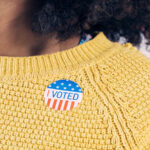Nebraska Rejects Winner-Take-All Proposal
On April 3, 2024, Nebraska legislators rejected a bill to change how the state’s electors are awarded to presidential candidates. The proposed change could have affected the outcome of the presidential election in November.
Splitting Electoral Votes
The Electoral College casts the official votes for the president and vice president. The Electoral College is made up of 538 members known as electors. Each state has the same number of electors as it does members in the U.S. Congress. These electors cast their votes based on the rules in their state. A candidate must have 270 or more electoral votes to win the presidency.
The popular vote winner is the candidate who gets the most votes. In most states, that person is awarded all the electoral votes for the state. In Nebraska, however, the electoral votes are divided. The state gives two of its five electoral votes to the statewide popular vote winner. The remaining three electoral votes are given to the candidate who wins in each of its three congressional districts.
By awarding these three votes independently, both presidential candidates can win electoral votes in Nebraska. Some Nebraskans believe this makes presidential candidates pay more attention to the state when campaigning. Splitting Nebraska’s electoral votes also makes it possible for both presidential candidates to receive 269 total electoral votes. If the candidates tie, the U.S. House of Representatives would decide the outcome, with each state getting one vote.
The Bill
In March 2023, Nebraska state Senator Loren Lippincott, a Republican, introduced a bill to award all five of the state’s electoral votes to the popular vote winner. The bill gained new attention because of the upcoming November presidential election. Former President Donald Trump, Nebraska Governor Jim Pillen, and other members of the Republican Party publicly announced their support for the bill.
The majority of Nebraska voters support Republican candidates. Republican presidential candidates have won the statewide popular vote in Nebraska since 1964. However, in the 2008 and 2020 presidential elections, the Democratic presidential candidate won Nebraska’s 2nd congressional district, which contains the city of Omaha. The Democratic presidential candidates in these elections each received one of Nebraska’s electoral votes. The proposed bill would have eliminated this situation.
Result of the Vote
The current session of the Nebraska legislature ends on April 18, 2024. To quickly bring the bill to a vote, Republican state Senator Julie Slama added it as an amendment to existing legislation. Many legislators felt the bill was not related to the amendment, which is required by Nebraska law. The bill failed to pass in a vote of 8-36.
It is unlikely the bill will come up for another vote before the legislative session ends this year. Since the legislature will not meet again until 2025, this removes the possibility of impacting this year’s presidential election. Governor Jim Pillen could call for a special legislative session to try to pass the bill. However, many political analysts think a special session is unlikely as the bill lacks enough legislative support to pass.



